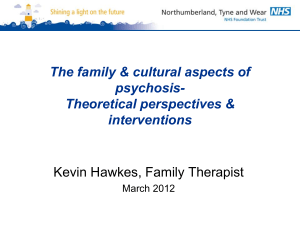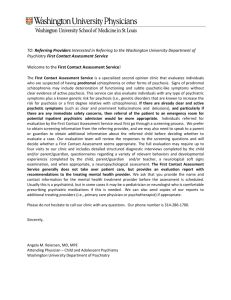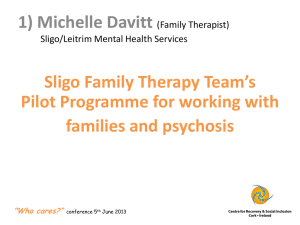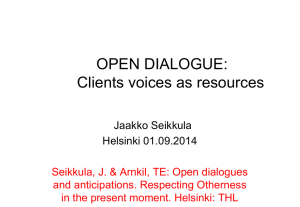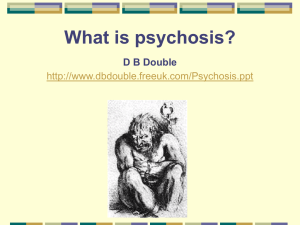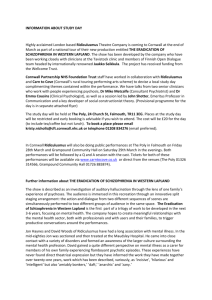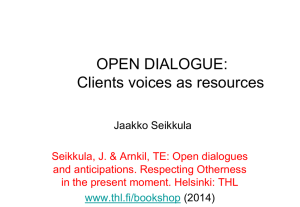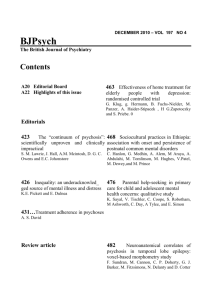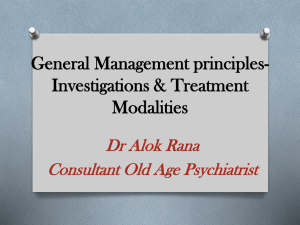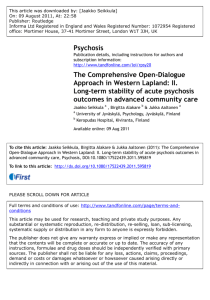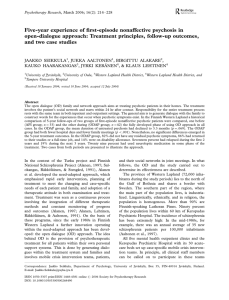Quality Standards Consultation for Psychosis and
advertisement
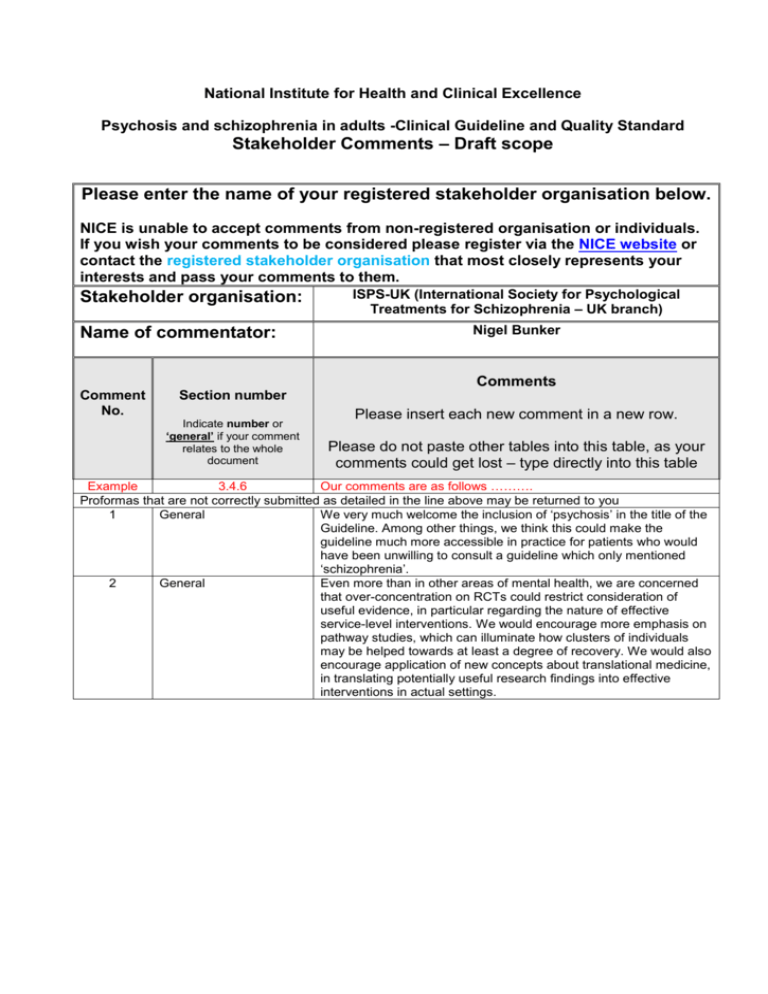
National Institute for Health and Clinical Excellence Psychosis and schizophrenia in adults -Clinical Guideline and Quality Standard Stakeholder Comments – Draft scope Please enter the name of your registered stakeholder organisation below. NICE is unable to accept comments from non-registered organisation or individuals. If you wish your comments to be considered please register via the NICE website or contact the registered stakeholder organisation that most closely represents your interests and pass your comments to them. Stakeholder organisation: Name of commentator: ISPS-UK (International Society for Psychological Treatments for Schizophrenia – UK branch) Nigel Bunker Comments Comment No. Section number Indicate number or ‘general’ if your comment relates to the whole document Please insert each new comment in a new row. Please do not paste other tables into this table, as your comments could get lost – type directly into this table Example 3.4.6 Our comments are as follows ………. Proformas that are not correctly submitted as detailed in the line above may be returned to you 1 General We very much welcome the inclusion of ‘psychosis’ in the title of the Guideline. Among other things, we think this could make the guideline much more accessible in practice for patients who would have been unwilling to consult a guideline which only mentioned ‘schizophrenia’. 2 General Even more than in other areas of mental health, we are concerned that over-concentration on RCTs could restrict consideration of useful evidence, in particular regarding the nature of effective service-level interventions. We would encourage more emphasis on pathway studies, which can illuminate how clusters of individuals may be helped towards at least a degree of recovery. We would also encourage application of new concepts about translational medicine, in translating potentially useful research findings into effective interventions in actual settings. 3 General 4 2.1a) 5 3.1.1 b) 6 3.3.1 b) We think that there may now be sufficient further evidence to warrant the update also including psychological interventions. As well as papers mentioned below (notably Aaltonen et al 2011, Seikkula et al 2011, Brabban et al 2011), there is a new paper from the Danish National Study (Rosenbaum et al, 2012) showing effectiveness of Supportive Psychodynamic Psychotherapy against treatment as usual, with gains on both PANNS and GAFF measures. References: Aaltonen J, Seikkula J & Lehtinen K (2011) The comprehensive open-dialogue approach in Western Lapland: I. The incidence of non-affective psychosis and prodromal states. Psychosis, 3 (3), 179191. Seikkula J, Alakare B & Aaltonen J (2011) The comprehensive open-dialogue approach in Western Lapland: II. Long-term stability of acute psychosis outcomes in advanced community care. Psychosis, 3 (3), 192-204. Brabban, A., Callcott, P., Christodoulides, T., Dudley, R., French, P., Lumley, V., Tai, S.J. and Turkington, D. (2011). Cognitive therapy for people with a schizophrenia spectrum diagnosis not taking antipsychotic medication: an exploratory trial. Psychological Medicine, 1-8. Rosenbaum B, Harder S, Knudsen P, Koster A, Lajer M, Lindhardt A, Valbak K & Winther G (2012) Psychodynamic psychotherapy vs treatment as usual for first-episode psychosis: two years outcome. Accepted by Psychiatry, and awaiting publication. We suggest adding “... and which may call for flexibility in services’ response”. This specification of early intervention services is a helpful clarification. It would be helpful to make explicit mention here of inpatient services. Standards of care in inpatient mental health settings continue to be of concern to policy makers and care quality commissioners following the results of national and local audits and service user-led satisfaction surveys.[1] Much of the concern is around patient experience, with service users reporting a lack of regular, meaningful engagement with hospital ward staff; specifically, service users feeling they are not treated with due respect, dignity and understanding. Negative symptoms of schizophrenia are often associated with complex difficulties in communicating and relating interpersonally with others. To this end, the usefulness of the feedback provided by the arts therapists (art, dance movement/body oriented, drama and music therapists), in helping ward-based staff understand the bridge from non-verbal to verbal dialogue, which these therapies can provide for service users presenting with challenging behaviours, should perhaps be considered specifically as a component within acute multidisciplinary teamwork, in addition to the existing general recommendation that these therapies be offered to all people with schizophrenia, particularly for the alleviation of negative symptoms, and started either during the acute phase or later, including inpatient settings. [1] Relevant surveys can be found at www.cqc.org.uk and www.quality-health.co.uk 7 3.3.1 c) 8 3.3.2 9 3.3.2 a) 10 3.3.2 d) 11 3.4 It seems that a crucial element in effective multi-disciplinary team responses may be the extent to which an informed psychological attitude pervades the team’s work as a whole (Aaltonen et al, 2011, and Seikkula et al, 2011). As well as psychological work thought of as a distinct activity, we think the recent evidence raises the question of ways in which training can enable a more psychologically responsive stance on the part of the service as a whole (ie, not only specialist psychological workers, but also a psychologically effective whole service). This would build on the advice in the 2009 Guideline that “psychoanalytic and psychodynamic principles may be considered to help healthcare professionals to understand the experience of people with schizophrenia and their interpersonal relationships”. In keeping with comment 6 above, one would expect this to be at least as relevant to inpatient teams as to community-based ones. References: Aaltonen J, Seikkula J & Lehtinen K (2011) The comprehensive open-dialogue approach in Western Lapland: I. The incidence of non-affective psychosis and prodromal states. Psychosis, 3 (3), 179191. Seikkula J, Alakare B & Aaltonen J (2011) The comprehensive open-dialogue approach in Western Lapland: II. Long-term stability of acute psychosis outcomes in advanced community care. Psychosis, 3 (3), 192-204. We wonder if the heading here is the result of a layout mistake (“The psychological management of previous trauma. Key issues that will not be covered”). We take it that the heading should simply read “Key issues that will not be covered”, and “The psychological management of previous trauma” was intended to feature in section 3.3.1. On this assumption, the need to consider multi-disciplinary teams’ psychological responsiveness and consistency, and their capacity to hear individuals’ experience, are all the more pertinent. Might this update offer a timely opportunity to consider specifically the question: are there circumstances and categories of patient where neuroleptic medication is not helpful (Lehtinen et al, 2000), and where psychological intervention can be effective in its absence (Brabban et al, 2011; Bechdolf et al, 2012)? References: Lehtinen V, Aaltonen J, Koffert T, Rakkoloinen V & Sylvalahti E (2000) Two year outcome in first-episode psychosis treated according to an integrated model. Is immediate neuroleptisation always needed? European Psychiatry, 15, 312-320. Brabban, A., Callcott, P., Christodoulides, T., Dudley, R., French, P., Lumley, V., Tai, S.J. and Turkington, D. (2011). Cognitive therapy for people with a schizophrenia spectrum diagnosis not taking antipsychotic medication: an exploratory trial. Psychological Medicine, 1-8. Bechdolf A, Wagner M, Ruhrmann S et al. (2012) Preventing progression to first-episode psychosis in early initial prodromal states. British Journal of Psychiatry, 200 (1). We would favour an adjustment to the wording to “The exclusive management of affective conditions where they do not interact with psychotic symptoms, or psychotic levels of social functioning”. Within the list of main outcomes, we would favour individuals’ sense of ‘personal meaning’ (related to, but wider than, ‘meaningful activity’) near or at the top of the list. 12 4.1.1 b) / 4.1.2 b) Often the way in which a diagnosis of schizophrenia is discussed with a patient itself constitutes a significant positive or negative element in treatment. We feel strongly that some statement about how the discussion should be conducted should be included. 13 14 15 Please add extra rows as needed Please email this form to: schizophreniaupdate@nice.org.uk Closing date: 5 January 2012 PLEASE NOTE: The Institute reserves the right to summarise and edit comments received during consultations, or not to publish them at all, where in the reasonable opinion or the Institute, the comments are voluminous, publication would be unlawful or publication would be otherwise inappropriate.
